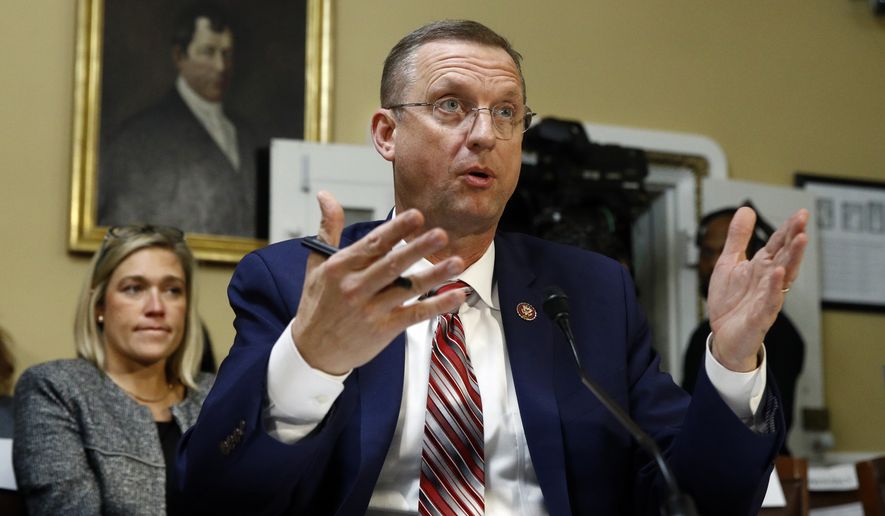Fentanyl, a deadly synthetic opioid, is set to become legal next month unless House Democrats vote to extend its illegal status, but they’re just beginning to debate the issue this week.
Rep. Doug Collins of Georgia, the ranking Republican on the House Judiciary Committee, accused House Democrats of prioritizing impeachment over addressing the danger posed by fentanyl, which is blamed for an overwhelming number of overdoses in the U.S. last year.
They will face a tight deadline before the illegal designation known as “scheduling” expires Feb. 6, with just seven legislative days remaining on the calendar to pass a fix.
“Chairman [Jerrold] Nadler and [House] Speaker [Nancy] Pelosi have been so consumed with impeachment, they’ve failed to do their job. While Democrats are playing politics, the ban on a deadly drug hangs in the balance,” Mr. Collins told The Washington Times.
He demanded that the House vote on a temporary solution to ban the fentanyl knock-offs known as analogues that unanimously passed the Senate on Jan. 16.
“Each year, millions of families and communities across the nation lose loved ones at the hands of the opioid crisis,” he said. “Failing to extend the ban of this dangerous drug will put countless lives at risk, which is why Congress must act now. I’m calling on Chairman Nadler and Speaker Pelosi to bring this bill to the floor for a vote immediately.”
The day after the Senate’s bill passed, the House Judiciary subcommittee on crime, terrorism and homeland security announced it would hold a hearing Tuesday on the fentanyl class scheduling. The hearing will overlap with the Senate impeachment trial, led by members of the House Judiciary and Intelligence committees.
In February 2018, the government institute a two-year emergency ban classifying all substances chemically similar to fentanyl as Schedule I drugs, similar to heroin.
Fentanyl and its knock-offs previously were classified as Schedule II drugs, meaning they are highly addictive but have a legitimate medical purpose. By classifying as a Schedule I drug, the government is saying fentanyl as no medicinal use.
Fentanyl is about 100 times more potent than morphine and 50 times more powerful than heroin. The lab-made knock-offs could be even stronger.
Rep. John Ratcliffe of Texas, ranking Republican of the House Judiciary subcommittee, echoed Mr. Collin’s frustrations.
“The Democrats threw away an opportunity to renew the fentanyl ban through appropriations legislation last year, and they’re now delaying the extension of a critical tool to hold fentanyl traffickers accountable,” Mr. Ratcliffe told The Times in a statement. “If their concern is with mandatory minimum sentences, they must think saving drug traffickers a little jail time is more important than preventing more fentanyl-related overdose deaths in our country.”
The Senate bill would extend the current deadline by 15 months, giving lawmakers until May 2021 to find a more permanent solution.
“It’s very important that we continue to keep fentanyl analogues listed as one of the most dangerous drugs in the world,” Sen. Lindsey Graham, chairman of the Senate Judiciary Committee, said in a statement. “I urge my colleagues in the House to swiftly pass this legislation so we can get it signed into law.”
With the government’s ban set to expire in February, the Justice Department and Drug Enforcement Administration implored lawmakers to extend the ban.
The temporary ban has slowed the rate at which new fentanyl imitations are introduced into the black market and eliminated drug cartel’s incentives to create new substances, a top DEA official testified before the Senate Judiciary Committee last year.
Attorney General William Barr also launched a public campaign to push for lawmakers to act.
Cartels are creating fentanyl knock-offs in labs at an astonishing rate. The DEA in 2018 identified 3,591 new compounds of fentanyl, a 27% increase from 2017.
When asked about the majority’s plans to address the fentanyl scheduling deadline, Democratic staffers focused on the hearing itself.
Set to testifying at the hearing are: Brett P. Giroir, assistant secretary for health for the Department of Health and Human Services, and Amanda Liskamm, director of opioid enforcement and prevention efforts for the Justice Department.
Four non-government witnesses are listed: Kevin Butler, federal public defender from the Northern of Alabama; Sandra Comer, a neurobiology professor at Columbia University; Daniel Ciccarone, a professor of family and community medicine at University of California, San Francisco; and Donald Holman, whose son died from an overdose in 2017.
• Jeff Mordock can be reached at jmordock@washingtontimes.com.
• Gabriella Muñoz can be reached at gmunoz@washingtontimes.com.




Please read our comment policy before commenting.